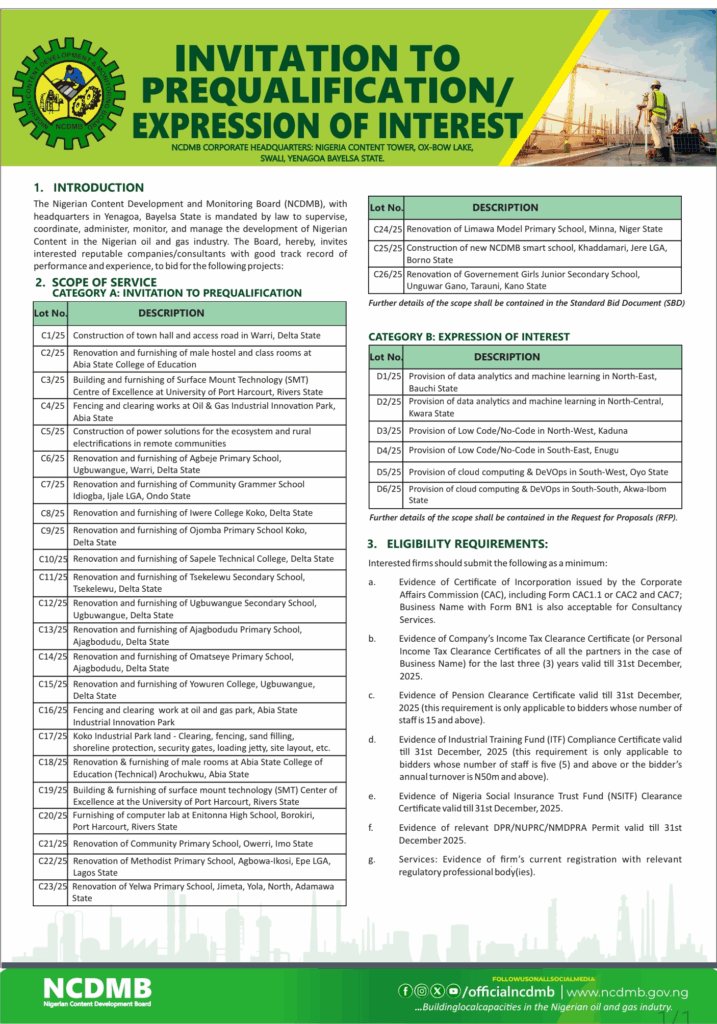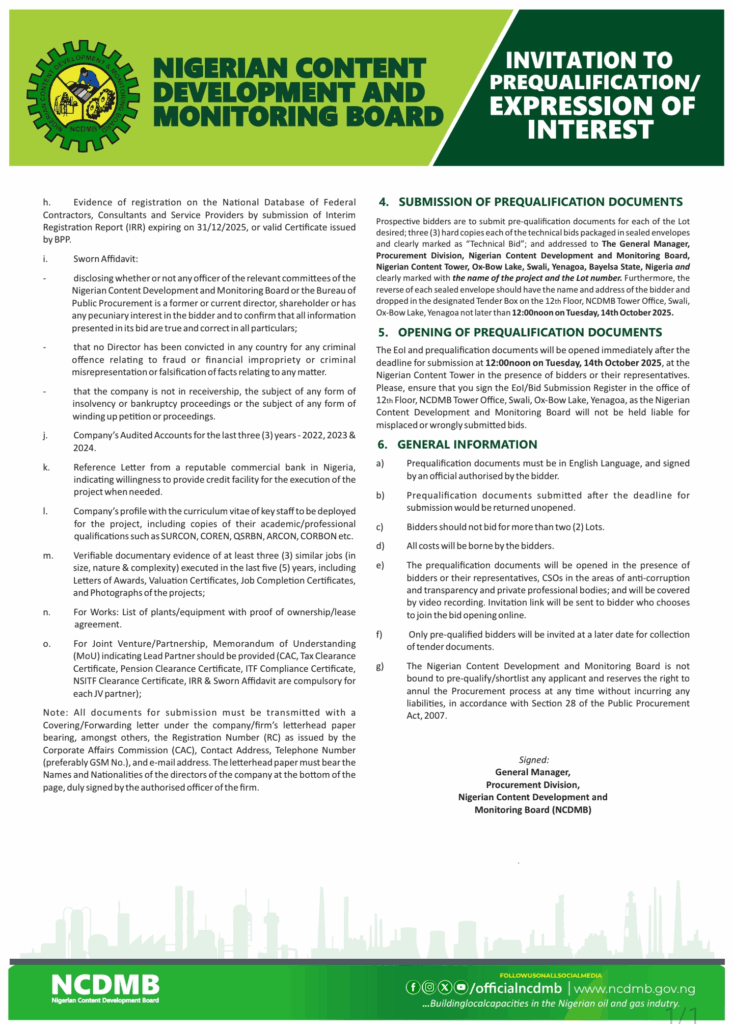Mrs Ogbue canvasses hybrid funding support for upstream upstarts
* AFREC charges African players to align with ESG

Sopuruchi Onwuka
Pioneer President of Women in Energy Network (WIEN), Mrs Fumni Ogbue, has called for mobilization of dormant private funds in the country to finance upstream petroleum industry projects.
She also appealed to the Nigerian Content Development and Monitoring Board (NCDMB) to evolve ways of providing funding guarantees for fledgling indigenous upstream petroleum players struggling to reach first oil.
Financing intervention, she pointed out, becomes necessary in the face of visible difficulties new player encounter in funding initial field development projects.

Mrs Ogbue was a panelist in a panel debate on ‘Unlocking Affordable and Sustainable Funding for Africa Oil & Gas Businesses: Strategies for Growth, Innovative and Energy Transition’ as part of the Africa Local Content Forum at the ongoing Africa Oil Week in Accra, Ghana.
The General Manager in charge of Corporate Communication at the Nigerian Content Development and Monitoring Board (NCDMB), Dr Obinna Ezeobi, moderated the debaters drawn from the African Union and some oil producing countries in the continent.
In responding to questions on weak institutional funding capacity for the Nigerian petroleum industry, Mrs Ogbue made it clear that Nigeria can no longer rely on foreign direct investments to drive growth in the country’s crucial energy sector.
She opined that whereas it is clear that the existing Nigerian Content Intervention Fund (NCIF) is overstretched, it could still provide guarantees for loans from development banks.
Oracle Intelligence reports that the NCIF provided by the NCDMB and managed by Bank of Industry (BOI) and Nigerian Export and Import (NEXIM) Bank provide low cost credit facilities to indigenous service providers, local community contractors, and women led businesses to enable them overcome financing constraints.
Former Minister of State for Petroleum Resources, Prof Ibe Kachikwu, had last week called for the NCIF to be built to a billion dollars and made to finance exploration and production projects in the country.
But Mrs Fateemah Mohammed of the NCDMB who was also the debate panel at AOW explained at the NCIF has already assisted over 100 beneficiaries with cheap loans and may not carry big ticket projects.
She said the strength of the NCIF lies in its partnership with development banks.
However, Mrs Ogbue noted that the country’s critical energy industry has continued to suffer credit squeeze while other sectors like real estate haul around massive cash.
She also pointed at huge reservoirs of pension funds and similar private capitals that could be harnessed to build active credit lines for credible and derisked petroleum development projects.
While advising beginners in exploration and production operations to drive cautiously with pragmatic low cost approach, Mrs Ogbue insisted that the NCI Fund could still help out by providing equity capital or loan guarantees.
While not playing down the role of foreign investments in the industry, Mrs Ogbue noted that FDI should necessarily interact with domestic capital to provide the industry hybrid of foreign and local financing opportunities.
Mrs Ogbue canvasses hybrid funding support for upstream upstarts
Sopuruchi Onwuka
Pioneer President of Women in Energy Network (WIEN), Mrs Fumni Ogbue, has called for mobilization of dormant private funds in the country to finance upstream petroleum industry projects.
She also appealed to the Nigerian Content Development and Monitoring Board (NCDMB) to evolve ways of providing funding guarantees for fledgling indigenous upstream petroleum players struggling to reach first oil.
Financing intervention, she pointed out, becomes necessary in the face of visible difficulties new player encounter in funding initial field development projects.
Mrs Ogbue was a panelist in a panel debate on ‘Unlocking Affordable and Sustainable Funding for Africa Oil & Gas Businesses: Strategies for Growth, Innovative and Energy Transition’ as part of the Africa Local Content Forum at the ongoing Africa Oil Week in Accra, Ghana.
The General Manager in charge of Corporate Communication at the Nigerian Content Development and Monitoring Board (NCDMB), Dr Obinna Ezeobi, moderated the debaters drawn from the African Union and some oil producing countries in the continent.
In responding to questions on weak institutional funding capacity for the Nigerian petroleum industry, Mrs Ogbue made it clear that Nigeria can no longer rely on foreign direct investments to drive growth in the country’s crucial energy sector.
Mrs Funmi Ogbue who is the Managing Director of Zigma Energy Limited holds extensive experience in petroleum industry projects. She also plays in the human capital development segment of the industry.
She opined that whereas it is clear that the existing Nigerian Content Intervention Fund (NCIF) is overstretched, it could still provide guarantees for loans from development banks.
Oracle Intelligence reports that the NCIF provided by the NCDMB and managed by Bank of Industry (BOI) and Nigerian Export and Import (NEXIM) Bank provide low cost credit facilities to indigenous service providers, local community contractors, and women led businesses to enable them overcome financing constraints.
Former Minister of State for Petroleum Resources, Prof Ibe Kachikwu, had last week called for the NCIF to be built to a billion dollars to cover exploration and production projects in the country.
But Mrs Fateemah Mohammed of the NCDMB who was also the debate panel at AOW explained at the NCIF has already assisted over 100 beneficiaries with cheap loans and may not carry big ticket projects.
She said the strength of the NCIF lies in its partnership with development banks.
However, Mrs Ogbue noted that the country’s critical energy industry has continued to suffer credit squeeze while other sectors like real estate haul around massive cash.
She also pointed at huge reservoirs of pension funds and similar private capitals that could be harnessed to build active credit lines for credible and derisked petroleum development projects.
While advising beginners in exploration and production operations to drive cautiously with pragmatic low cost approach, Mrs Ogbue insisted that the NCI Fund could still help out by providing equity capital or loan guarantees.
While not playing down the role of foreign investments in the industry, Mrs Ogbue noted that FDI should necessarily interact with domestic capital to provide the industry hybrid of foreign and local financing opportunities.
Representative of the African Energy Commission (AFREC) on the panel, Mr Bob Felix Ocitti, made it clear that African players funds from development finance institutions (DFIs) must align with climate action goals.
In declaring that AFREC has no dime to advance players in Africa, Ocitti advised new players to align investments in addressing access to energy and clean cooking solutions.
He made it clear that climate compatibility in energy development, and balancing energy needs with climate agenda are new strategies for attracting multilateral funding.
According to him, African energy firms have to be climate compatible, decarbonize their portfolios and diversity into low carbon energy.
By incorporating renewable energy into their exploration and production activities, he said, companies could qualify for financing from DFIs.
He told players that global financing for new energy development projects have ESG conditions attached to them.
The panel debate featured participants from Namibia, Angola and Nigeria.




